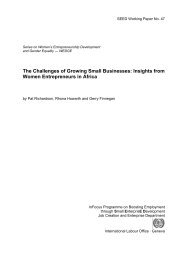manual: women workers' rights and gender equality - International ...
manual: women workers' rights and gender equality - International ...
manual: women workers' rights and gender equality - International ...
Create successful ePaper yourself
Turn your PDF publications into a flip-book with our unique Google optimized e-Paper software.
Briefing Note 9 Violation of Rights at Work: File a Complaint<br />
This briefing note is of special relevance to workers, covered under the Labour Code, in other<br />
words formal sector workers. It specifies the rules for solving problems at workplaces such as<br />
factories <strong>and</strong> companies in the private sector. Informal sector workers, <strong>and</strong> the groups excluded<br />
from this legislation may find the information useful as it illustrates the process of the steps to take<br />
in conflict resolution <strong>and</strong> the settlement of disputes.<br />
Rights of workers are formulated in the Labour Code 1997. Article 1 defines to which workers the<br />
law applies:<br />
This law applies to every enterprise or establishment of industry, mining, commerce, crafts,<br />
agriculture, services, l<strong>and</strong> or water transportation, whether public, semi-public or private, nonreligious<br />
or religious, whether they are of professional education or charitable characteristics as<br />
well as the liberal profession of associations or groups of any nature whatsoever.<br />
This law shall not apply to:<br />
- Judges of the Judiciary<br />
- Persons to a permanent post in the public service<br />
- Personnel of the police, army, military police,<br />
- Personnel serving in the air <strong>and</strong> marine transportation<br />
- Domestic or household servants, unless otherwise expressly specified under this law<br />
The last two categories however, are entitled to apply the provisions on freedom of union under the<br />
law.<br />
In case of any violation of <strong>rights</strong> at work, workers who are protected by the Labour Code 1997 (see<br />
above) can complain. The procedures are different for individual <strong>and</strong> collective disputes. A brief<br />
guideline is given below.<br />
1. Individual dispute<br />
Try to solve the problem first within the enterprise:<br />
- if there is a grievance procedure in the enterprise: follow this procedure<br />
- go to your direct supervisor<br />
- go to the management of the enterprise<br />
- go to your trade union<br />
If this does not solve the problem you can file a complaint with:<br />
- a conciliator of the Ministry of Social Affairs, Labour Vocational Training <strong>and</strong> Youth<br />
Rehabilitation (MOSALVY). This is a voluntary procedure, the Ministry acts as an intermediate<br />
<strong>and</strong> cannot force anything. The procedure is free of charge.<br />
- The Court, this can be a second step but you can also go straight to court. The process is<br />
lengthy <strong>and</strong> can be expensive. It may be difficult but can be the only option to expose a ‘wrong’<br />
<strong>and</strong> justify a ‘right’. L<strong>and</strong>mark judgements by courts have led to real changes in society, due to<br />
their effects on public awareness <strong>and</strong> societal debate on what a country st<strong>and</strong>s for or strives<br />
for.<br />
158

















